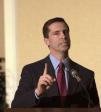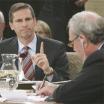Will the real Ontario stand up .. another part of the rising Next Canada?
Feb 26th, 2005 | By Randall White | Category: Canadian Provinces George W. Bush has just been off trying to sell his own new-old gospel of freedom and liberty in the global village to the old world in Europe.
George W. Bush has just been off trying to sell his own new-old gospel of freedom and liberty in the global village to the old world in Europe.
Down several notches in the intergovernmental hierarchy, Paul Martin’s Liberals have just brought in a budget that tries to spread love all across Canada, by giving everyone something, and no one very much in any near future. (While continuing to pay down debt, and suddenly spending more on refurbishing the country’s modest military might than anyone else in Ottawa has for a good many years.)
Down a few notches again, back at Queen’s Park in the capital city of Canada’s most populous province, hardly anyone nowadays is saying that Ontario Premier Dalton McGunity looks a lot like Anthony Perkins, in the classic Hitchcock movie Psycho.
 And, partly inspired by fellow premiers in Quebec and Newfoundland, Mr. McGuinty has embarked on a “strong campaign” to get back, oh say 20%, of the federally redistributed tax dollars Ontario now sends to Ottawa. So the McGuinty provincial Liberals can balance their own budget, down on the hard ground of current Canadian government and politics, where the rubber for such big-ticket items as health and education hits the road.
And, partly inspired by fellow premiers in Quebec and Newfoundland, Mr. McGuinty has embarked on a “strong campaign” to get back, oh say 20%, of the federally redistributed tax dollars Ontario now sends to Ottawa. So the McGuinty provincial Liberals can balance their own budget, down on the hard ground of current Canadian government and politics, where the rubber for such big-ticket items as health and education hits the road.
As the latest issue of the indispensable newsletter Inside Queen’s Park has pointed out, the regional democratic electorate’s traditional preference for Canadian national over Ontario provincial politics could once again thwart the largest ambitions of provincial politicians. According to the Centre for Research and Information on Canada, in 2003 83% of Ontarians said they were very attached to Canada. Only 57% confessed a similar attachment to Ontario.
So Premier McGuinty’s pleas may especially fall on deaf ears among the 75 federal Liberal MPs who hold seats in Ontario, and do so much to keep the precarious Martin minority government in office. Even the local punditry in Toronto has lately been reminding local television viewers about the wisdom of the benevolent 1960s Ontario premier John Robarts on such matters. It is just not good for Canada when the provincial government of Ontario and the federal government in Ottawa get too far apart.
 Yet there may still be a little more room for Premier McGuinty’s new campaign for more Ottawa cash to help balance his provincial budget than first meets the eye. As the premier urges, Ontario is now sending some $23 billion more to Ottawa each year than it gets back in federal public services. This is largely based on a philosophy of federal-provincial revenue equalization that made more practical sense in John Robarts’s Ontario of the 1960s than it does in the less commanding Canadian province of the early 21st century.
Yet there may still be a little more room for Premier McGuinty’s new campaign for more Ottawa cash to help balance his provincial budget than first meets the eye. As the premier urges, Ontario is now sending some $23 billion more to Ottawa each year than it gets back in federal public services. This is largely based on a philosophy of federal-provincial revenue equalization that made more practical sense in John Robarts’s Ontario of the 1960s than it does in the less commanding Canadian province of the early 21st century.
Prime Minister Martin himself has recently alluded somewhat vaguely to the benefits that the Ontario private sector enjoys from its strategic position at the centre of Canada’s national free market place. But somewhere at the back of its very well-informed and up-to-date mind, official Ottawa must somehow be aware that, here as elsewhere, things have changed quite a lot in the past generation of the present confederation, and north of the Great Lakes as everywhere else.
The fabled Canadian-American manufacturing sector in Ontario, to take just one case in point, is nowadays most dependent on the free market for automobiles in the United States. Based on this aspect of the current Canadian philosophy of federal-provincial revenue equalization, Ontario might just as well be sending its surplus tax dollars to Mississippi as to any province of Canada.
 Besides, if you look deeply enough into the Ontario regional past, the province already has a long history of being quite prepared, as Premier McGuinty himself has recently said, to “flex its muscles,” when push really starts getting to shove on its most vital interests.
Besides, if you look deeply enough into the Ontario regional past, the province already has a long history of being quite prepared, as Premier McGuinty himself has recently said, to “flex its muscles,” when push really starts getting to shove on its most vital interests.
In the late 19th century the founding Liberal premier of the modern Province of Ontario, Oliver Mowat, did not at all agree with John Robarts in the 1960s, about relations between Ottawa and Queen’s Park. Mowat fought John A. Macdonald on many fronts – and won on a lot of them, as Ontario’s present geographic extent, among other things, still bears witness to today. Mowat also served as Ontario premier for 24 consecutive years – a record for winning in provincial elections only fairly recently bested by Preston Manning’s father in Alberta (which has also lately been shipping quite large numbers of surplus tax dollars to other parts of Canada too).
You could of course say that, well, Oliver Mowat and John A. Macdonald were from different political parties. But the last time fellow Liberals were in office at both Ottawa and Queen’s Park – during the turbulent late 1930searly 1940s era of “Canada’s Huey Long,” Mitch Hepburn, and the “incredible Canadian,” William Lyon Mackenzie King – the Ontario provincial and Canadian federal governments were regularly at each other’s throats. And Mitch Hepburn had something to do with the fact that the modern system of federal-provincial equalization payments in Canada got under way in the 1950s, instead of the 1940s, when it was first dreamed up.
 As retired Major-General Lewis Mackenzie has also recently wisely observed on Ontario television, we are often fortunate in Canada nowadays to live in a country which seriously remembers almost nothing that happened more than 10 years ago. And this may help keep the lid on any profoundly strident revival of Ontario’s worst habits from its own regional past.
As retired Major-General Lewis Mackenzie has also recently wisely observed on Ontario television, we are often fortunate in Canada nowadays to live in a country which seriously remembers almost nothing that happened more than 10 years ago. And this may help keep the lid on any profoundly strident revival of Ontario’s worst habits from its own regional past.
Premier McGuinty, however, has nonetheless put anyone who may be interested on notice that any workable present-day grappling with the broader question of “fiscal imbalance” in Canadian federal-provincial financial relations – also of particular interest to such places as Quebec and Western Canada – is somehow going to have to recognize Ontario’s quite down-to-earth and increasingly urgent financial problems too.
At least if Dalton McGuinty has anything to say about it. And the 57% of Ontarians who say they are very attached to Ontario could just be enough to keep him in office for quite a while too. Given the current state of the provincial party system, the Liberals managed to win 72 of the 103 seats in the provincial legislature in 2003, with less than 47% of the popular vote. (Of course there’s a proposal about proportional representation hanging around Queen’s Park somewhere these days, but that still seems quite far from any form of accomplished fact.)
 As for the considerably larger 83% of Ontarians who said they were very attached to Canada in 2003, the historic electoral data suggest that John A. Macdonald in Ottawa had a somewhat parallel advantage over Oliver Mowat in the late 19th century. But Mowat nonetheless continued to win provincial elections – and remained in office considerably longer than Macdonald (or even Mackenzie King). A rather more regionally aggressive early 21st century Ontario just might be another important ingredient in the “Next Canada” that John Ibbitson of The Globe and Mail has already told us “will not be denied forever.”
As for the considerably larger 83% of Ontarians who said they were very attached to Canada in 2003, the historic electoral data suggest that John A. Macdonald in Ottawa had a somewhat parallel advantage over Oliver Mowat in the late 19th century. But Mowat nonetheless continued to win provincial elections – and remained in office considerably longer than Macdonald (or even Mackenzie King). A rather more regionally aggressive early 21st century Ontario just might be another important ingredient in the “Next Canada” that John Ibbitson of The Globe and Mail has already told us “will not be denied forever.”
Randall White is the author of Ontario 16101985: A Political and Economic History (Dundurn Press, 1985), and Ontario Since 1985 (eastendbooks, 1998).

